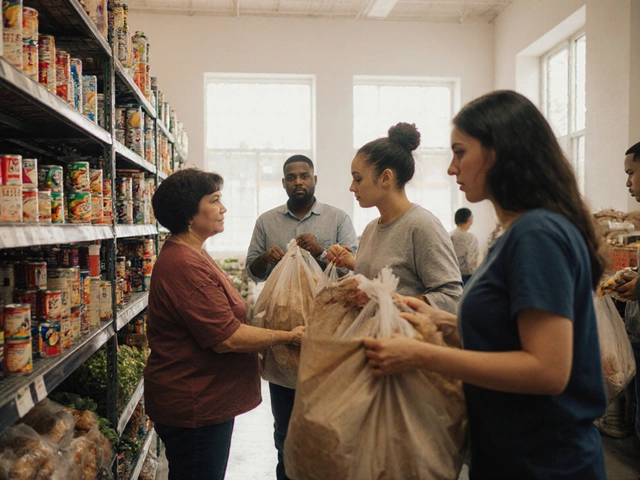Is Volunteering Worth Your Time? Exploring Volunteer Opportunities
Volunteering is like opening a door to a world where you can lend a hand and make things better for someone else, and perhaps yourself in the process. It’s not just about giving but also about learning and growing. Imagine joining a community garden project and finding peace in working with the earth, or assisting at a local shelter and realizing how stories connect us. The reasons and rewards of volunteering are vast, personal, and often unexpected.
However, like any commitment, volunteering can come with its challenges. It’s important to weigh these aspects carefully before diving in. Finding a role that resonates with your interests and availability can be key to a satisfying experience. Additionally, knowing how to navigate your responsibilities while maintaining balance can help you make the most out of this enriching journey.
- Why Volunteer? The Benefits Explained
- Potential Drawbacks of Volunteering
- How to Choose the Right Volunteer Opportunity
- Tips for a Fulfilling Volunteering Experience
Why Volunteer? The Benefits Explained
Volunteering can often be viewed not just as a generous act, but as a transformative journey that impacts both the giver and the receiver. When you step into the world of volunteering, you might soon realize the profound personal growth you experience. Engaging with different communities opens up perspectives that textbooks might not offer, as you are exposed to real-world situations that challenge your understanding and empathy. Many people find that by helping others, they ultimately help themselves too, gaining insights into their strengths and areas for improvement. The interactions allow volunteers to cultivate soft skills such as communication, teamwork, and problem-solving, which are highly valued professionally and can enhance career prospects.
The benefits of volunteering are not limited to personal development. Engaging in volunteer work is known to foster a deeper sense of connection and community spirit. You might find yourself laughing over shared stories in a soup kitchen or forming bonds with those who strive for the same noble cause. Such connections can alleviate feelings of loneliness and isolation, which is significant given the increasing mental health challenges in today's fast-paced world. Additionally, volunteering often leads to the creation of lifelong friendships, as shared goals and passion become a strong foundation for relationships.
Volunteering is not just rewarding on a personal level but it also contributes to the community impact. Many local services rely on volunteers to function, from libraries to helpline centers, and events like fundraisers or cultural fests depend heavily on such involvement. This effort is critical because it helps these services offer support at little to no cost, facilitating access for everyone, no matter their financial situation. This creates a cycle of goodwill, where volunteers support structures that build stronger, more resilient communities. It’s interesting to note that a report by the Corporation for National and Community Service found that regular volunteering correlates with a decrease in local crime rates and better educational performance among school children due to community engagement.
Interestingly, volunteering can also have health benefits. Studies indicate that people who volunteer regularly tend to enjoy a longer lifespan, reduced stress levels, and a greater sense of overall happiness. By focusing energy on helping others, volunteers often experience a decrease in their own stress and anxiety, possibly owing to the personal satisfaction derived from making a positive difference. According to an article published by Harvard Health Publishing, volunteering has similar therapeutic benefits to exercise, reducing incidents of high blood pressure among regular participants. These remarkable benefits underscore why volunteering is not just an act of giving but also a pathway to improved well-being.
One might wonder what old adages surround such good deeds. Consider this: “The best way to find yourself is to lose yourself in the service of others,” proclaimed Mahatma Gandhi. This quote encapsulates the essence of volunteering. By giving your time and effort selflessly, you might embark on a journey of discovering facets of yourself that were previously unexplored. Indeed, volunteering can lead to an enriched life, emboldening one's capacity for love, compassion, and connection. It's these experiences that make volunteering not just a worthy endeavor but a fulfilling one. Lao Tzu once said, "A journey of a thousand miles begins with a single step," and for many, volunteering could very well be that first step towards making a difference both in their community and personal life.

Potential Drawbacks of Volunteering
Volunteering, while deeply rewarding and impactful, is not without its challenges. One of the main issues potential volunteers might face is the time commitment, which can sometimes be underestimated, leading to stress in balancing personal, professional, and social life. Especially if you're volunteering while managing a full-time job or family obligations, the demands can quickly pile up. This tension is particularly evident during peak seasons of activity or when the needs of the organization temporarily spike, necessitating extended hours that were not originally anticipated.
Another significant concern stems from the suitability and alignment of the volunteering role with one's personal skills and interests. Volunteers often dive into roles they are passionate about, but without a clear understanding of the role's expectations, it can lead to a mismatch, causing dissatisfaction and burnout. According to a survey by VolunteerMatch, 40% of volunteers reported feeling overqualified or under-challenged by their assignments. Such experiences, if prolonged, can lead to frustration and may deter individuals from continuing to dedicate their time meaningfully.
Many volunteers also face the reality of limited resources. Non-profits and community initiatives often operate within tight budgets, which can restrict their ability to provide necessary tools, training, or support to volunteers. This insufficiency can hinder the ability to perform tasks effectively, reducing the quality of the service provided and the end satisfaction for both the volunteer and the recipient. As a result, volunteers may find themselves needing to improvise or subsidize their activities, unintentionally adding financial strain to their commitment.
Furthermore, the emotional toll of volunteering in certain settings should not be overlooked. Working closely with vulnerable populations, such as the homeless or ill patients, may be deeply fulfilling but can also be emotionally draining and lead to compassion fatigue. This phenomenon, sometimes described as secondary traumatic stress, can affect one's mental health, making it critical for volunteers to have access to supportive debriefings or counseling when needed. The Harvard Health Publishing notes, "Volunteers need to be aware of their own emotional and physical limits to continue providing effective support."
"Volunteering is commendable, but it must be a balanced act of self-care," emphasizes Dr. Lisa Watson, a community psychologist. Her insights remind us that while volunteering indeed plays a vital role in community development, recognizing our limits is equally necessary for sustainable engagement.
Lastly, the issue of recognition sometimes haunts the volunteer scene. Whether it's a lack of appreciation from the organization or perceived undervaluation from society, the absence of acknowledgment can dim the intrinsic motivation that fuels many volunteers. Studies show that recognition – even in simple forms such as thank you notes or public acknowledgments – significantly boosts volunteer retention. Therefore, it's essential for organizations to establish a culture of appreciation, celebrating their volunteers regularly to sustain morale and commitment.

How to Choose the Right Volunteer Opportunity
Deciding where to dedicate your time is as essential as finding time to volunteer itself. You must align your volunteer work with your personal interests, skills, and available time. Start by reflecting on what causes stir your passion. Do you love teaching? Engaging in environmental protection? Perhaps helping the elderly resonates with you. Understanding what inspires you can guide you toward avenues that will keep you motivated and committed.
Picking the right volunteer opportunities isn't just about passion; it's kind of like matching a puzzle. Know what skills you possess and how they can be put to use. Are you a solid organizer, a digital marketer, or maybe a good listener? Charities and non-profit organizations often have specific needs, and matching your strengths to these gaps makes you an invaluable asset. It's well worth the effort to seek opportunities that let you leverage your skill set and maybe even help you learn new things in return.
Location and time commitment are significant factors to consider, too. Volunteering close to home can save you time, allowing you to commit more freely. But what about virtual volunteering? In today's digital landscape, there are countless opportunities to contribute without geographical constraints. Make an honest assessment of your schedule and make sure it aligns with the volunteering requirements. Is it a one-day event, weekly, or more involved? Keep this in mind to ensure it doesn't weigh on your existing commitments.
Sometimes, the decision can be overwhelming, but thankfully, there are numerous platforms that can help. Websites like VolunteerMatch or Idealist are excellent starting points. They allow you to filter opportunities based on cause, skills, and location. Some people also find it useful to speak with current volunteers. Their firsthand experiences can offer invaluable insights and help you decide whether a particular opportunity is right for you.
"Volunteering is at the very core of being a human. No one has made it through life without someone else's help." – Heather French Henry
Additionally, understanding the impact the organization aims to achieve can be a guiding light. Research their mission and read reports or reviews to ensure their values resonate with yours. Ultimately, the goal is to find a cause that you're excited about supporting, in which you can see the tangible results of your contribution. This connection can keep you anchored and continually inspired to make a difference.

Tips for a Fulfilling Volunteering Experience
Embarking on a volunteering journey demands thoughtful preparation and a willingness to embrace new experiences. To ensure your efforts lead to personal growth and community benefit, start by reflecting on your interests and skills. By aligning your passions with the needs of an organization, you can create impactful experiences that resonate with you on a deeper level. Consider what energizes you—whether it’s working with children, spending time outdoors, or advocating for social change. Knowing what excites you helps in finding the right fit in vast volunteer opportunities. This connection can transform your volunteer role from a mere obligation into a satisfying adventure.
Before committing, it’s wise to research and understand the expectations of your chosen volunteer role. Be candid about your availability and any potential limitations. Organizations value honest and reliable volunteers, and setting clear boundaries from the beginning fosters a positive relationship. As you prepare, indulge in a community-centric mindset. Volunteering is not just an act of giving; it's an opportunity to learn and grow with others. An open mind and a warm heart can help bridge the gap between differences and similarities, leading to valuable personal insights and memorable connections.
Engaging with an organization that values your contribution provides a sustainable structure for your involvement. Seek feedback regularly and utilize it to improve your skills. It reflects your commitment to the cause and helps you become an integral part of the team. Networking with fellow volunteers and beneficiaries can also enrich your experience. Sharing stories and learning from others expands your horizons, and might even inspire new perspectives.
As Mother Teresa once said, "Not all of us can do great things. But we can do small things with great love." Keep this in mind as you aim to make a difference, however small it might seem.
Finally, take time to reflect on your experiences. What did you enjoy? What challenged you? How did the experience contribute to your personal or professional development? Keeping a journal or diary can serve as a great tool for capturing your journey and growth. It can provide insights into your strengths and potential areas of improvement. This reflection not only aids in personal growth but also reinforces the impact of your work, allowing you to appreciate the significance of your contributions and anticipate future roles in volunteering.







